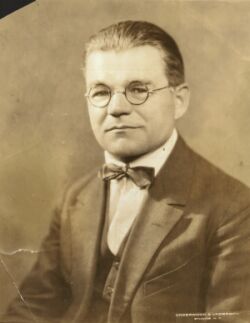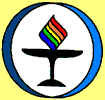
Norbert Fabian Čapek
1870-1942

Maja Veronica Čapek
1888-1966

| Norbert & Maja Čapek |  Norbert Fabian Čapek 1870-1942 |
 Maja Veronica Čapek 1888-1966 |
| photographs by Underwood & Underwood Studios, NY | ||
The following brief account is based primarily upon the book by Richard Henry, Norbert Fabian Čapek: A Spiritual Journey (Skinner House, 1999). We recommend the book for its fascinating and inspiring details on Čapek as a person and as a spiritual leader, and on the historical context of his life.
Čapek first became interested in Unitarianism in 1910, as a result of a meeting with Tomas Masaryk (then a professor, later to be President of Czechoslovakia). Čapek tried that year, without success, to get the American Unitarian Association to support his efforts to promote liberal religion.
At the beginning of World War I in 1914, Čapek moved to the United States, after being advised that he was in danger of arrest by Austrian authorities because of his nationalistic and anti-Catholic writings, Early in 1915 he was tried for heresy by a Baptist tribunal, but acquitted, and for the next three years he was pastor of the First Slovak Baptist Church in Newark. During this time he organized an alliance of the various Slovak associations in New Jersey, and was active in the movement for Czechoslovak independence.
Maja V. Oktavec, born April 8, 1888 in Bohemia, came to the United States in 1907, obtained a degree from the Columbia University School of Library Science, and in 1909 went to work at the Webster Branch of the New York Public Library. In 1914 she was put in charge of its Czech section. There she met Norbert Čapek. They were married June 23, 1917. (Čapek had already been married and widowed twice, and had nine children.) Maja resigned her position at the library a week after their marriage. They bought a home in Belleville, and in 1919 Čapek became pastor of a small congregation there. But in September of that year, having come to the conclusion that he could no longer be a Baptist, he resigned his pastorate.
At the end of World War I, Czechoslovakia became independent, and many Czechs decided to leave the Roman Catholic church. Čapek was eager to return to his native land and play a part in its spiritual reawakening. He and Maja decided in 1920 to sell their Belleville home to get money for the voyage. Because of a delay in the buyer's payment, they found it necessary to vacate the house and rent an apartment in East Orange. While living there, they encouraged their three school-age children to try out various church Sunday schools and report back to their parents on the lessons. The one they finally found that pleased them was the First Unitarian Church of Essex County (in Orange). After the children had attended several times, Norbert and Maja also visited the church, and found there "not only clear heads but warm hearts, too." They signed the membership book on January 10, 1921. The minister, Dr. Walter Reid Hunt, learning of Čapek's intent to return to Czechoslovakia, arranged for him to meet the president of the American Unitarian Association, Dr. Samuel A. Eliot. By May, Čapek had a commitment from the AUA to support his work in Czechoslovakia. He bid farewell to the church in Orange on June 5, and he and Maja embarked for Europe June 30.
By February 1922, Čapek had organized the Prague Congregation of Liberal Religious Fellowship, and the services were soon drawing standing-room-only crowds. The Sunday sermon was repeated and debated in a Tuesday evening program. On June 24, 1923, the first Flower Communion was celebrated. Maja was ordained as a minister in 1926. For several years the fellowship met in rented halls. With financial help from the AUA and the British and Foreign Unitarian Association, they acquired and renovated a medieval palace. In 1930 the Unitarian Church of Czechoslovakia was officially recognized by the Czech government.
In 1939, shortly before the German occupation of Czechoslovakia, Maja Čapek left for the United States to lecture and raise funds for a joint Unitarian-Friends program to assist endangered refugees and internees. The AUA offered positions in the United States to Norbert Čapek and to his daughter Bohdana and her husband Karel Haspl (who had attended seminary at Berkeley and were now assisting in the Prague ministry). They declined the offers, feeling it their duty to remain with their people. The activities of the church continued during the occupation as before, though under Gestapo surveillance Čapek was more subtle in his sermons and articles.
On March 28, 1941, Čapek and his youngest daughter Zora were arrested by the Gestapo. They were convicted of listening to foreign radio broadcasts. Čapek was sentenced to a year in prison, but eleven months that he had already been confined while waiting for trial were to be counted in the sentence. (Zora, who had not only listened to the broadcasts but shared notes of them with someone else, was given an eighteen-month term). In the midst of a wave of executions and deportations of Czechs by the Nazis following the assassination of Reinhard Heydrich (the German official in charge of the occupied country), a Gestapo officer overrode the court's sentence and ordered that Norbert Čapek be sent to the concentration camp at Dachau, "return unwanted." He arrived there July 5, 1942. and on October 12, 1942 was sent on an "invalid transport," and evidently killed that day with poison gas, though his official death certificate states that he died October 30 of a cerebral hemorrhage.
Maja Čapek did not learn of Norbert's death until after the war. After her lecture tour, she served as a minister in New Bedford, Massachusetts, for three years. From 1944 to 1950 she worked for the United Nations Relief and Rehabilitation Agency, helping displaced persons settle in Yugoslavia, Egypt and Palestine. She died December 1, 1966.
Page maintained by Paul Axel-Lute. last revised Oct.13,2001